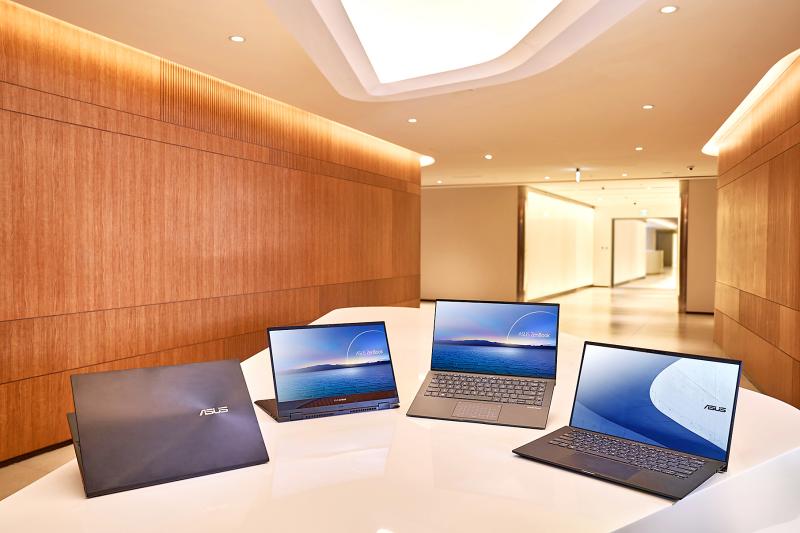Asustek Computer Inc (華碩) on Friday said it made NT$3.739 billion (US$129.3 million) in unaudited standalone net profit last month, up 62 percent from a year earlier.
The unaudited profit for Asustek’s brand-name business translated into earnings per share of NT$5.04, the company said in a regulatory filing.
The firm also reported unaudited standalone revenue of NT$36.586 billion, up 34.57 percent annually.

Photo courtesy of Asustek Computer Inc
The PC vendor released the monthly results at the request of the Taiwan Stock Exchange, as its shares were classified as “attention securities” by the exchange regulator due to the abnormal trading volume of the stock in the most recent six business days, the exchange said.
Based on the firm’s data, third-quarter brand-name revenue reached NT$118.61 billion, up 41.05 percent from the previous quarter and up 37.78 percent from a year earlier due to demand created by the remote work and learning trends amid the COVID-19 pandemic.
Asustek has been among the biggest beneficiaries of the increase in people staying at home due to the pandemic, which has boosted its sales of consumer and commercial PCs.
The firm’s shipments were also boosted by a steady increase in gaming demand as the pandemic has dragged on, analysts said.
The company had earlier said that it remained cautiously positive regarding its outlook for next year.
Asustek forecast that its diverse product offerings across the consumer, commercial, education and gaming sectors would make it a key beneficiary of the new norms in the post-COVID era.
Credit Suisse Group AG analysts said in a note last week that Asustek’s sales for this quarter would be supported by an increase in new laptop and graphics card ranges, as well as the restocking of inventory at distribution channels.
However, tightness with regards to key components would continue to drag on further increases in sales, they said.
“We believe the PC demand will remain more resilient into year-end with Asustek as key beneficiary on higher consumer mix; however, we remain cautious on the sustainability of the demand uptick, and will continue to monitor its smartphone strategy for turnaround,” the analysts wrote.
Asustek shares ended 0.41 percent higher at NT$242.5 in Taipei trading on Friday. They have risen 4.75 percent from the beginning of this year.

KEEPING UP: The acquisition of a cleanroom in Taiwan would enable Micron to increase production in a market where demand continues to outpace supply, a Micron official said Micron Technology Inc has signed a letter of intent to buy a fabrication site in Taiwan from Powerchip Semiconductor Manufacturing Corp (力積電) for US$1.8 billion to expand its production of memory chips. Micron would take control of the P5 site in Miaoli County’s Tongluo Township (銅鑼) and plans to ramp up DRAM production in phases after the transaction closes in the second quarter, the company said in a statement on Saturday. The acquisition includes an existing 12 inch fab cleanroom of 27,871m2 and would further position Micron to address growing global demand for memory solutions, the company said. Micron expects the transaction to

Vincent Wei led fellow Singaporean farmers around an empty Malaysian plot, laying out plans for a greenhouse and rows of leafy vegetables. What he pitched was not just space for crops, but a lifeline for growers struggling to make ends meet in a city-state with high prices and little vacant land. The future agriculture hub is part of a joint special economic zone launched last year by the two neighbors, expected to cost US$123 million and produce 10,000 tonnes of fresh produce annually. It is attracting Singaporean farmers with promises of cheaper land, labor and energy just over the border.

US actor Matthew McConaughey has filed recordings of his image and voice with US patent authorities to protect them from unauthorized usage by artificial intelligence (AI) platforms, a representative said earlier this week. Several video clips and audio recordings were registered by the commercial arm of the Just Keep Livin’ Foundation, a non-profit created by the Oscar-winning actor and his wife, Camila, according to the US Patent and Trademark Office database. Many artists are increasingly concerned about the uncontrolled use of their image via generative AI since the rollout of ChatGPT and other AI-powered tools. Several US states have adopted

A proposed billionaires’ tax in California has ignited a political uproar in Silicon Valley, with tech titans threatening to leave the state while California Governor Gavin Newsom of the Democratic Party maneuvers to defeat a levy that he fears would lead to an exodus of wealth. A technology mecca, California has more billionaires than any other US state — a few hundred, by some estimates. About half its personal income tax revenue, a financial backbone in the nearly US$350 billion budget, comes from the top 1 percent of earners. A large healthcare union is attempting to place a proposal before